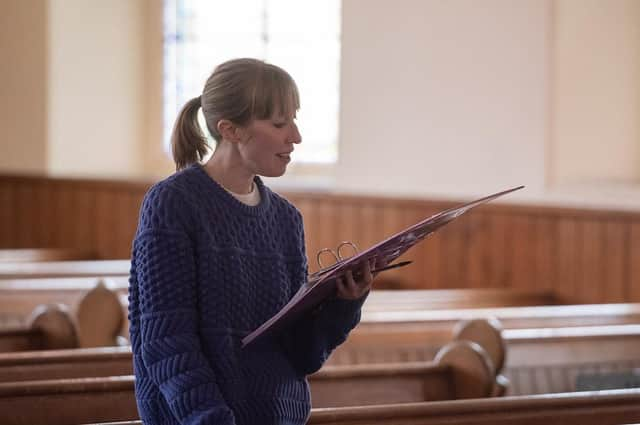Prism: The Online Theatre Show Where the Audience Chooses the Ending


When Claire Wood turned her hand to online theatre last year, something unexpected happened. The playwright had always intended to make her play Roulette interactive, and in its online form it asked the Zoom audience to vote on how the couples in a dating gameshow were matched.
That side of the performance, staged by her own Production Lines company, went as planned. What she didn't foresee was the audience's spontaneous employment of the chat function.
Advertisement
Hide Ad"They started commenting on the characters," she says. "A dialogue struck up between different audience members. It was thrilling because I was sat on my own, watching my actors who were scattered all over the place, and getting a sense that people were there, listening and taking something from it. It made the whole thing feel zingy and live."
Those actors were skilled enough in improvisation to incorporate the comments into the script. It gave each performance the "you had to be there" quality we take for granted in live theatre, but can be hard to come by on screen.
This got her thinking. The Covid-19 pandemic has forced performers and audiences to keep their distance. Few, including Wood herself, would say that was ideal, but could there be a way, she wondered, to make more of the audience's presence? Might it be possible, even online, to break down the barrier between spectator and performer?
"I spent August 2020 in a total rage that there wasn't any theatre," says Wood, who works by day as a civil servant and has long experience as a director and writer with Edinburgh Graduate Theatre Group. "Then I thought, 'For goodness' sake, stop being so self-pitying. Everyone's in the same boat. Can you do anything that's interesting given the constraints we have?'"
The trick, she reasoned, was to write a play that made use of the tools the internet provides. "I wanted to adapt the theatre to suit the medium," she says. "I thought, 'Is there a way to take the interaction that we comfortably do in a Microsoft Teams meeting and serve it up in theatre form? Can we create some of that sense of the audience sitting there holding their breath that you get in a building together?"
She adds: "What is brilliant about theatre is the sense of being connected to the performers and to the people around you and sharing an experience. I wondered if you could serve up a play through Zoom, but use audience interaction to affect what happens."
Advertisement
Hide AdPrism, her latest online play, builds on her experience with Roulette and, to a lesser extent, 2020's Shrapnel, which was about the loneliness of the pandemic. The new one puts the audience in the role of a panel in a child custody case. Before them are three people: the father, a yoga instructor; the mother, a Hollywood actor; and Tzeporah, the mother's European PA, who keeps getting saddled with their poor child, Storm.
The four year-old is due to go to school, but will her first day be in Forres with dad, in LA with mum or in Switzerland with the PA?
Advertisement
Hide AdWhat this means, of course, is the six actors in Ross Hope's production have to be ready to respond to the audience's decisions. In Roulette, the audience chose the order of the scenes and voted for the couple it wanted to bring together. The audience for Prism goes one step further and chooses the content.
Wood has written three alternative flashback scenes and three endings. Depending on the will of each audience, it is possible one flashback scene and two endings might never be heard. It's not as elaborate as Intimate Exchanges by Alan Ayckbourn, which has 16 possible endings, but it is created with the same spirit of adventure.
"It's a thankless gig for the actors because they've signed up to learn a third more than might ever be seen," she says. "It’s difficult because the presentation of the characters also varies according to whose version of the story we hear. They'll get no notice of which version they have to do because it will be decided in the moment by the audience. It's all scripted but it's quite a leap of faith."
Supported by Creative Scotland's Digital Pivot scheme, which helps people develop technical skills, the play is also about the unreliability of memory. "You know when you think back to an experience you've had with somebody and you both recount it and your versions are completely different? You were both at exactly the same place, but you'll each remember a version of it that bears no relation to the other version. Prism takes the idea that three different people have been involved in three separate conversations and each of them has a distinct and different recollection."
She adds: "The title Prism is chosen because perspective is everything. My perspective on how I behave could be entirely different from everybody else's perspective. The play might encourage people to reflect on how truthful they're being with themselves."
Using the chat and voting functions, the audience will choose whose version of the story they would like to hear. It means even the playwright herself will be desperate to know what happens next. "Each person's story presents them as the hero and the others as hopeless, then the audience decides who gets the child, so I can't wait to see the outcome…"
Advertisement
Hide AdPrism is online from 2-5 February, see https://www.citizenticket.co.uk/events/production-lines/prism/
A message from the Editor
Thank you for reading this article. We're more reliant on your support than ever as the shift in consumer habits brought about by coronavirus impacts our advertisers.
If you haven't already, please consider supporting our trusted, fact-checked journalism by taking out a digital subscription at https://www.scotsman.com/subscriptions